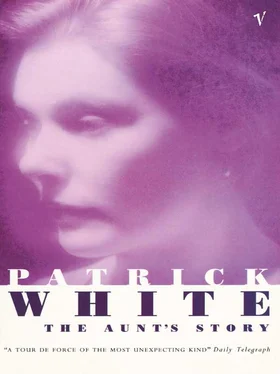From the pink house beside the poplars the woman in the periwinkle dress watched some Anglaise making a walk without a hat. Outside the house the rosemary bushes were spread with shirts. The woman in the periwinkle dress had come outside to inspect her washing. Now she felt it carefully for damp. She twitched a sheet that twigs had made mountainous.
Was it this way to the tower? Theodora asked.
She stood by the gate of the pink house. She waited to hear words. The woman’s arms were white with flour. Theodora waited for one word, out of a lost epoch, shaped and baked in kitchens.
Yes, said the periwinkle woman, it was this way to the tower, it was past the olive field and the well, though it was the habit of people to make this walk by road.
The woman pointed with her white arm. There was no doubt that the strayed Anglaise would find the tower. But strange, the strange Anglaise . The woman gathered up her washing. She carried the armful of stiff white sheets into her square pink house, out of the mist.
Theodora walked straight. A smell of soap and baking had lessened the influence of Sokolnikov. She would hedge the olive field, as the woman had advised. She walked almost joyfully. Beside the field she heard the great, sounding depth of the open well, of which the stone lip had sucked moisture from the air. The tower too would have filled with mist, and the intolerable, pervasive smell of crushed nettles.
From the spine of the hill Theodora saw the tower. It was strong and solitary and white. But whether its thick walls enclosed, in addition to damp, the smell of nettles, and possibly a dead bird, some personal exaltation or despair, was as obscure as the alleged moment in which Napoleon split the historical darkness of that part of the coast.
But I have come here for a purpose, Theodora said, if only to be confronted with my own inadequacy. At a distance her mouth contracted under the coldly sensual lips of stone. She began to go down.
She went quickly, quicker, now that she saw. She saw the solitary figure, moving among rocks, away from the tower, out of her line of vision. She could not identify, but she could hope, but she could run. A bird whirred out of the heather. She was hardly conscious of the intervening stones, or the ankles in which she trusted, though these were thick as sticks. Some animal, rabbit or hare, cowered and leapt away in terror hearing her torn breath.
Then she began to call with what was left.
‘Katina! Katina! Katina Pavlou!’ Theodora called.
Out of the blur of wind and running, on the now settled shoulder of the hill, the face of Katina Pavlou turned.
‘Why, Miss Goodman, it is you,’ Katina Pavlou said.
Touching with her feet the obvious red coast road, Theodora Goodman gathered her awkwardness.
‘Yes,’ she said. ‘I came.’
‘How funny you look. And without a hat,’ Katina Pavlou said.
Her voice was cold. Her voice was as cold as stone.
‘I left on the spur of the moment. And I walked farther than I thought. Now I am out of breath,’ Theodora Goodman said.
They began to walk along the coast road which would lead eventually to houses.
‘The mist is unexpected, I believe,’ Theodora said, ‘for this time of year.’
‘The mist?’ said Katina Pavlou coldly.
Her head was turned, so that she was looking at the sea. Her hair hung, in some fresh way it had been done, Theodora Goodman saw, for some purpose. The hair, the body of Katina Pavlou, were conscious and intent.
‘Oh, let us walk. Let us get it over quickly,’ Katina Pavlou said. ‘This is a hateful road.’
She walked quicker. She walked too quickly. Katina Pavlou was going over, Theodora saw, she was going over all the time on the new high heels that she had begun to wear.
‘Katina dear,’ Theodora Goodman said.
She took the cold, dead hand, that she would begin to warm. Her face began to fumble with words, and a rather stupid kind of happiness, that was also painful.
‘Yes, Katina,’ she said, ‘this is always a long and intolerable stretch of road, but it is not interminable.’
I am quite, quite stupid, Theodora felt, I can feel it on my face.
But Katina Pavlou looked at the sea. And along the red coast road the enclosed automobiles pressed towards expensive pleasures. Faces eyed for a moment people who walk.
‘Have you ever been inside the tower, Miss Goodman?’ Katina Pavlou asked.
And now Theodora felt inside her hand the hand coming alive. She felt the impervious lips of stone forming cold words. She dreaded, in anticipation, the scream of nettles.
‘No,’ said Theodora, ‘I have not been inside the tower. I imagine there is very little to see.’
‘There is nothing, nothing,’ Katina said. ‘There is a smell of rot and emptiness.’
But no less painful in its emptiness, Theodora felt.
‘Still, I am glad,’ said Katina Pavlou, speaking through her white face. ‘You know, Miss Goodman, when one is glad for something that has happened, something nauseating and painful, that one did not suspect. It is better finally to know.’
Under the still skin of Katina Pavlou’s face the blood had not yet begun again to flow. Since yesterday, Theodora saw, the bones had come.
‘And what has happened in the meantime?’ Katina Pavlou asked, as they re-entered the territory of Dubonnet and Suze.
‘I doubt whether I am better informed than you,’ Theodora replied. ‘There was, of course, the failure of the municipal power. Here is Miss Grigg. Judging from her appearance darkness will reign.’
‘Yes, imagine, Katina,’ said Miss Grigg, who was standing squarely on the step. ‘How we shall manage to fork our food into our mouths is something only the Almighty knows.’
But Monsieur Durand said, ‘There shall be lamps and candles.’ And there were.
There were lamps and candles. There was the legendary light of oil and wax. There was the light of light. Now that Theodora had stitched her skirt, which had torn on a bush somewhere on a hillside, and washed away the dust, and the water had tightened round the edges of her face, she watched with pleasure the renewed objects of the dining-room. She did not eat much. She watched Katina Pavlou scooping the avocado. By lamplight, movement was smooth, the flesh as suave as avocados. The eyelids on Katina Pavlou’s face were still and golden, but uncommunicative. Tonight the faces at their separate tables did not communicate, and Theodora was relieved that they should remain contained, whether by exhaustion or some instinct for secrecy.
Only Mrs Rapallo’s table had not flowered. Here the light shrivelled into shadow and the upright box of Ryvita, with which normally Mrs Rapallo made havoc of silences.
‘Where is Mrs Rapallo?’ Theodora asked.
‘ Elle n’est pas descendue ,’ replied le petit. ‘Elle ne mange guère. Enfin, ça ne vaut pas la peine de descendre, et quand on risque de se casser la figure .’
Scarcely pausing in his saraband of plates, his body moved with the smoothness of contempt and custom. Le petit had pinched off a cigarette and stuck it behind his ear. He had a merciless continuity. And Mrs Rapallo’s Ryvita stood still.
‘Thank you. Yes, I shall take coffee,’ Theodora agreed.
Because to refuse le petit required daring. Or to dare the stairs, she considered, after the wry, medicinal coffee, the inhabited undergrowth of Mrs Rapallo’s room.
On the whole, she knew, there was less daring than duty in her knuckle.
‘Mrs Rapallo?’ she knocked. ‘It is Theodora Goodman. May I come in?’
Through some distance and the flat door she heard the sounds of revival.
‘Theodora who?’ said Mrs Rapallo. ‘Oh. Yes. You. Come inside, Theodora Goodman. I shall, of course, be glad.’
Читать дальше












